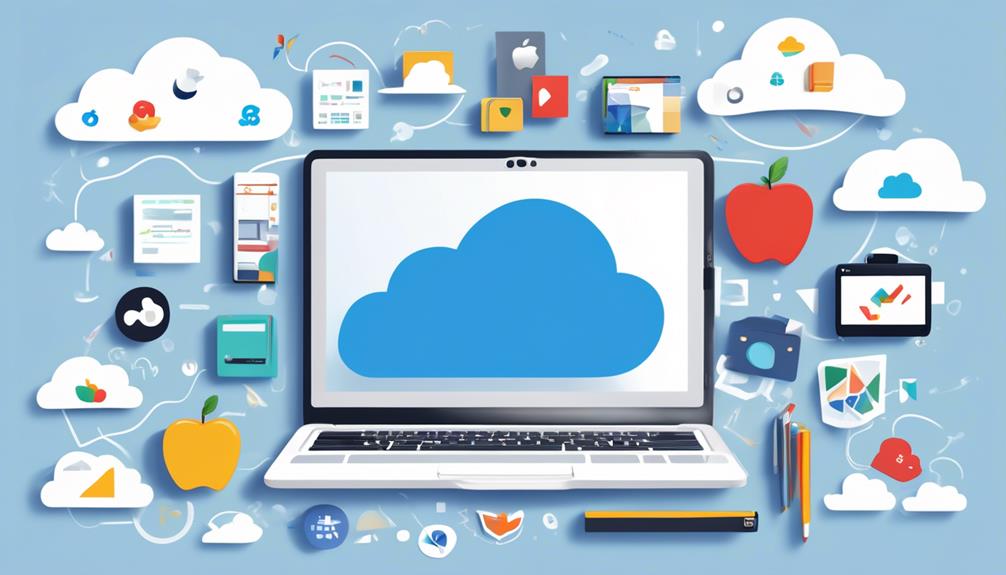Like a surfer catching the perfect wave, you’re riding the crest of technological advancement with a Chromebook in your hands. This lightweight, cloud-centric machine is making a splash in the tech world, but is it set to become the future of cloud computing?
They’re affordable, portable, and their operating system, Chrome OS, is simple and fast. But how far can they go in transforming our digital lives?
You’re about to embark on an exploration of whether Chromebooks can truly dominate the digital landscape in the years to come.
Key Takeaways
- Chromebooks harness the power of cloud computing by storing data and software on remote servers.
- Chromebooks are affordable, user-friendly, and designed for speed, performance, and real-time collaboration.
- They have become a popular choice in educational organizations and are carving out a significant niche in the market.
- Chromebooks excel in cloud connectivity, offering quick boot-up times, efficient resource usage, and real-time cloud-based document collaboration.
Understanding Cloud Computing

To fully appreciate the benefits of Chromebooks, you need to understand cloud computing, the technology that powers their efficient and versatile performance. Cloud computing is a technology that stores data and software on remote servers instead of on the device itself. When you use a Chromebook, you’re essentially harnessing the power of these servers. This means that all your files, applications, and settings are stored online, reducing the maintenance complexity of your device.
Chromebooks offer a cost-effective alternative to traditional laptops, making them a popular choice in educational organizations. Due to their fast boot-up and optimized performance, they’re suitable for a wide range of users. And with access to a growing ecosystem of Chrome Apps and Android apps, the versatility of your Chromebook is constantly expanding.
Moreover, Chromebooks are designed for collaboration and productivity. Thanks to their tight integration with Google Workspace and cloud storage, they’re particularly beneficial for remote work and learning.
The Rise of Chromebooks
You’ve likely noticed the growing presence of Chromebooks in the market, and there’s good reason for it. They’re not only affordable but also user-friendly, boasting simplicity and accessibility by storing most data and applications in the cloud.
Beyond that, they’re designed for speed, performance and real-time collaboration, making them particularly valuable in today’s connected world.
Chromebooks’ Growing Market Presence
As they continue to rise in popularity, Chromebooks are carving out a significant niche in the market, thanks in part to their affordability, simplicity, and seamless cloud integration. Chromebooks’ growing market presence is particularly noticeable in educational organizations, where their low cost and easy maintenance make them a preferred choice.
The question arises, are Chromebooks the future of cloud computing? Let’s look at some facts:
| Feature | Benefit |
|---|---|
| Affordability | Accessible at various price points |
| Simplicity | Easy maintenance and updates |
| Fast boot-up | Quick reaction times |
| Cloud Integration | Real-time collaboration, increased productivity |
Their adaptability, thanks to a growing ecosystem of Chrome Apps, including Android apps, strengthens the argument. So, it’s no surprise that Chromebooks are becoming a powerful contender in the realm of cloud computing.
Advantages of Chromebooks
Building on their growing market presence, let’s explore why Chromebooks are gaining traction, focusing on their key advantages.
One of the biggest advantages of Chromebooks is their simplicity. You use a Chromebook primarily through a web browser, simplifying maintenance, updates, and data backup.
They’re cost-effective, offering various pricing points that make them particularly popular in educational organizations.
In terms of speed, Chromebooks shine with quick boot-up times and fast performance, thanks to regular updates from Google. Moreover, they provide access to a large and growing ecosystem of Chrome Apps, including Android apps.
Lastly, designed with collaboration in mind, Chromebooks tightly integrate with Google Workspace, allowing for real-time collaboration and cloud storage, boosting productivity and accessibility.
Chromebooks and Cloud Connectivity
Harnessing the power of cloud computing, Chromebooks have emerged as a leading choice for users seeking simplicity, affordability, and high performance in a laptop.
Designed for accessibility, Chromebooks excel in cloud connectivity, storing most of your data and applications online. This allows for quick boot-up, efficient use of resources, and real-time cloud-based document collaboration.
You’ll find them particularly popular in educational organizations, where their low cost is a significant advantage. With access to a plethora of Chrome Apps, including Android apps, they’re adaptable for a wide range of users.
As long as you’ve got an internet connection, you have access to your documents, making Chromebooks ideal for work on the go.
Chromebook Features and Advantages
You might be wondering, what sets Chromebooks apart?
Let’s explore this by discussing their unique capabilities and the advantages of using them.
From cost-effectiveness to speed and performance, Chromebooks offer a range of features that may be just what you’re looking for.
Chromebook’s Unique Capabilities
Diving into the unique capabilities of Chromebooks, it’s clear that their simplified and safe computing, affordable price points, speedy performance, expanding app ecosystem, and seamless cloud integration set them apart in the world of technology.
As a Chromebook user, you’ll appreciate the ease of use and security that comes with a web-based operating system. The affordable price makes Chromebooks accessible to many, with exceptional speed and performance that doesn’t slow down over time.
You’ll also enjoy the expanding ecosystem of Chrome apps, including Android apps, further enhancing the capabilities of using a Chromebook. Lastly, the seamless integration with Google Workspace allows for real-time document collaboration, making Chromebooks ideal for both work and play.
Advantages of Using Chromebook
When it comes to the advantages of using a Chromebook, the simplicity, affordability, speed, broad app ecosystem, and collaboration capabilities are features that truly stand out.
You’ll find the user-friendly interface and cloud-based storage incredibly convenient. Plus, they’re budget-friendly, making them a top choice for students and professionals. Chromebooks boot up fast, react quickly, and receive regular updates to optimize performance.
You also gain access to a vast ecosystem of Chrome and Android apps, giving you the flexibility to adapt to your needs. What’s more, they’re designed for collaboration. You can edit documents in real-time, store them in the cloud, and access them from anywhere.
Clearly, Chromebooks are shaping the future of cloud computing.
Chromebooks in Education and Business

Often hailed as an affordable and user-friendly solution, Chromebooks are increasingly becoming the go-to choice for both educational institutions and businesses. Their simplicity and accessibility make them a perfect fit in today’s education and business environments where collaboration, efficiency, and cost-effectiveness are key.
Here’s why Chromebooks are gaining popularity in education and business:
- Affordability: Chromebooks are cost-effective, making them a budget-friendly choice both for students and professionals.
- Speed and Performance: With quick reaction times and fast boot-up, Chromebooks offer efficient performance even on low-end hardware.
- Wide App Ecosystem: From Google Docs to Android apps from the Google Play Store, Chromebooks provide a wide range of tools for different users.
- Integration with Google Workspace: Chromebooks are designed for collaboration. Google Workspace is tightly integrated into the Chrome OS ecosystem, promoting productivity and accessibility.
- Cloud-Based: Chromebooks store most data and applications in the cloud, ensuring easy maintenance and safety.
With their numerous advantages, it’s no surprise that Chromebooks in education and business are here to stay. They’re shaping the future of cloud computing, and your organization could benefit from their adoption.
Chromeos Vs Other Operating Systems
In comparing Chrome OS to other operating systems, you’ll find its design for simplicity and accessibility stands out, especially with its cloud-based system for data and application storage. This design reduces the complexity of maintenance, updates, and data backup, a stark contrast to the often cumbersome processes of other operating systems.
The cost-effectiveness of Chrome OS also gives it an edge. Chromebooks are available across various price points, making them a pocket-friendly option for many, especially educational organizations that benefit from their low cost and easy accessibility.
Another area where Chrome OS excels is performance. Chromebooks are known for their quick response times and fast boot-up. They maintain this speed over time, with regular updates from Google further optimizing their performance.
Chrome OS also offers an expanding ecosystem of Chrome Apps and is now compatible with Android apps. This flexibility enhances their utility compared to other operating systems.
Evaluating Chromebook Limitations

While Chromebooks pack in a multitude of features, it’s important to consider their limitations that can impact your user experience. When evaluating Chromebook limitations, especially with a new Chromebook, you’re likely to notice a few key constraints:
- Limited Offline Functionality: Chromebooks heavily rely on internet connectivity. So, without a stable connection, you could face obstacles in completing certain tasks.
- Compatibility Constraints: Some specialized software or apps mightn’t be compatible with your Chromebook. This can limit your device’s functionality for specific professional or creative tasks.
- Hardware Limitations: Chromebooks often have limited hardware configurations compared to traditional laptops. This could affect their performance during resource-intensive tasks.
- Dependency on Cloud Services: Since Chromebooks largely depend on cloud storage and web-based apps, they could pose privacy and security concerns.
- Limited Customization Options: Chromebooks offer fewer customization options than traditional operating systems, which might restrict your personalization and software choices.
Predicting the Future of Cloud Computing
Given these limitations of Chromebooks, it’s intriguing to speculate on the role they’ll play in the evolving landscape of cloud computing. As a user, you might find Chromebooks’ web-centric approach simplifies your computing needs, reducing maintenance and updates’ complexity. They’re an affordable option, making them popular, especially in education.
With a focus on speed and performance, Chromebooks ensure quick reaction times and a smooth user experience. Regular updates optimize efficiency, keeping you up-to-date in the fast-paced world of technology.
Their expanding ecosystem of Chrome Apps, including Android app compatibility, enhances productivity and entertainment for you. This aspect hints at a future where cloud computing is not just about storage but also about a comprehensive, seamless digital experience.
Chromebooks are designed for collaboration and cloud integration, offering real-time teamwork and seamless cloud storage. This accessibility from any location with an internet connection is crucial for the future of remote work and learning.
| Chromebooks’ Features | Future of Cloud Computing |
|---|---|
| Web-Centric Approach | Simplified Computing |
| Affordability | Accessibility |
| Speed & Performance | Efficiency |
| Expanded Ecosystem | Comprehensive Experience |
| Cloud Integration | Remote Work & Learning |
Frequently Asked Questions
Do Chromebooks Have a Future?
Yes, you’d bet Chromebooks have a future. Their simplicity, affordability, speed, and cloud integration make them appealing. Plus, their growing app ecosystem and popularity in education suggest they’re here to stay.
Do Chromebooks Use Cloud Computing?
Yes, Chromebooks do use cloud computing. They’re designed to store data and run applications from the cloud, giving you easy access to your files from anywhere and reducing the need for on-device storage.
How Many Years Will a Chromebook Last?
You’re asking about a Chromebook’s lifespan. Generally, they’ll last around 5 years. However, it’s dependent on usage and care. With good maintenance, they can push to 6 or 7 years. It’s all up to you.
Do Chromebooks Have Unlimited Cloud Storage?
Yes, you’ve got it right. Chromebooks do offer unlimited cloud storage, but only if you’re a Google Workspace subscriber. This allows you to store and access a large amount of data without worrying about local storage.
Conclusion
So, are Chromebooks the future of cloud computing? Given their simplicity, affordability, and speed, it’s a definite possibility.
They’re transforming education and business, with a growing app ecosystem that’s hard to ignore. Yes, they’ve limitations, but they’re evolving.
Keep an eye out, because Chromebooks could very well shape the future landscape of cloud computing.
